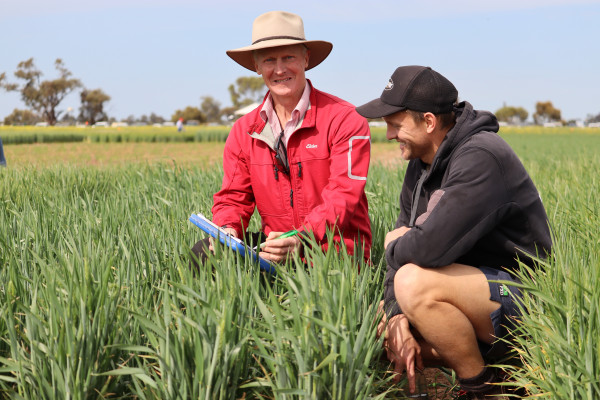THERE was a critical message for participants at the 2024 Birchip Cropping Group’s Main Field Day at Nullawil, south of Robinvale, this week.
Australian Export Grains Innovation Centre chief economist Professor Ross Kingwell told them “the most profitable farms are those which spend more time working on their business than in their business”.
Professor Kingwell is a leading agricultural economist with more than 45 years’ experience, including as a foundational leader with AEGIC since its inception in 2012.
In his decade-long profitability study of 250 West Australian farmers, Professor Kingwell says the most profitable farmers are those consistently looking for answers and work-life balance.
“The study highlighted profitable farmers are those who always have their antenna up, are always curious, always questioning, and they weren’t workaholics,” Professor Kingwell says.
“Farming for them was a social activity, not just business activity.”
Professor Kingwell’s presentation was a highlight for many of the 400 growers and advisers who attended the event.
His message dovetailed seamlessly with Eyre Peninsula, South Australia, farmer Mark Modra’s, whose following presentation focused on the importance of fatigue management and “knowing your capacity”.
Mark attributes a farm accident in which he sustained a serious head wound and five broken vertebrae to fatigue.
He told attendees he was no longer willing to compromise his health and wellbeing to meet the demands of farming.
“When we are fatigued, we make mistakes,” Mark says.
“We get tunnel vision and things in our peripheral vision are missed.
“It also affects our moods, our reflexes, our ability to communicate appropriately, and we are more likely to take shortcuts.”
Farmer Rodney Pohler from Nhill says both the farm profitability and the farm safety presentation had important messages for everyone listening.
“The field day was excellent as always,” Rodney says.
“Ross Kingwell’s presentation tied in nicely with Mark Modra’s with a focus on not being a workaholic.”
Keith farmer Tim Morcom adds: “The fatigue presentation highlighted that it’s a topic very much overlooked.
“It’s all common sense but not necessarily common.”
For farmer Andrew McLean from Keith, he too felt the farm profitability was a standout.
“Ross Kingwell’s comment about livestock and its negative affect on profitability in Western Australia reaffirms what we are doing on our farm,” Andrew says.
Rodney says he was also impressed by the adjuvant trial.
“It is good to see it in person,” he says.
“Some adjuvants are more targeted towards grass or broadleaf weeds so I learnt you need to know your main target.”
A recurring theme of the day was the importance of research funding from levies and government, investment in genetics and the effects for farm profitability.
BCG senior manager of extension and communication, Grace Hosking, says the “unlocking hyper-yielding cereals” discussion with Dr Yolanda Plowman and The University of Melbourne’s Professor James Hunt drew a large crowd and highlighted the importance of ongoing research.
“The smart disease management, NVT and long-coleoptile-wheats sessions further cemented the importance of research and investment in genetics,” Grace says.
Health and wellbeing were also important focuses at this year’s event, with East Wimmera Health Service, Central Mallee Health, headspace, WorkSafe and Agriculture Victoria on-site, together with Northern District Community Health, which provided health checks and advice throughout the day.
BCG’s Demi Taylor explains the purpose of having a health focus at the field day is to offer busy farmers and advisers convenient access to these crucial services.
More than 50 students from five schools attended the field day with its emphasis on education, highlighting career opportunities in the agricultural industry.
North Central LLEN’s agriculture education project co-ordinator Susan Gould says she was impressed by the student stream and engagement.
“It was successful day and the enthusiasm of the students and the staff enhanced the good vibe,” she says.
“The careers panel was the perfect mix for the student audience.
“I loved the altruistic and community focus of BCG, breaking down some of the traditional competitive and individualistic notions of agriculture.”
BCG staff and collaborators also enjoyed bringing to life research and extension topics such as optimising canola establishment, future-proofing Australia’s supply chain, active versus passive nitrogen application decision-making, on-farm biosecurity, an interactive trial and a pulse session.
All were well attended and created much discussion with presenters both during and after the sessions.
BCG chief executive Fiona Best says the Main Field Day is her group’s way of connecting with farmers.
“It lets us better share the work we do for them and their surrounding communities,” Fiona says.
“It’s an educational event showcasing the latest research and thinking in crop production and farming more generally.
“Bringing together such a diverse range of quality speakers is a highlight for BCG as an organisation and we thank our attendees, presenters, collaborators and sponsors for being actively involved in the day.
“We are also grateful to the Watts family for hosting the event on their farm and thank them for this invaluable support.”
For more details go to www.bcg.org.au/memberships
















